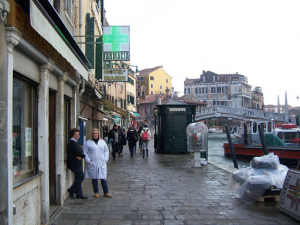We all go wine tasting for the sheer joy of it. Alas, there are some times that our pleasure is tempered by illness or other health-related problems. Now, we’re not talking about major issues that simply make it impossible for you to continue visiting wineries, when only a hospital will suffice. But even in Wine Country, people get colds and allergies, or need to see a doctor of pharmacist for something minor. This has happened to us more than a few times, so we’d like to share a few of our experiences, in hopes that our readers will benefit from them.
Photo courtesy of Farmacia Trovate.
Wine Country is full of growing things, and some of them make us sneeze and rub our eyes. In the United States we’re never far from a CVS, a Walgreen or a Rite-Aid. (There’s a very large CVS on Trancas Street in Napa where we always seem to wind up on our trips to Napa Valley.) Of course, we can find everything that we can at home, but these drug stores are especially important if we forget a prescription. (It’s happened a few times). We’ve had to call our physician for an emergency prescription, or have our credit card company do it for us. We have had some high expenses this way, because our insurance company wasn’t amused about paying for the same meds twice in a week or so.
Of course, there were special considerations when we’re buying medicines in Wine Country. We had to be careful about pills that made us drowsy, because we were driving…and tasting wine. The label on many medications warn not to do either of those things.
We have to double down on those problems when we’re tasting wine outside the US. Even in countries where English is the language spoken, they don’t call over-the-counter medicines by the same name as we do. We’ve had a headache in Australia and wanted something strong. We looked for Advil and remembered that it’s properly called ibuprofen. We got dull looks when we asked for either of those names until a friendly pharmacist remembered that ibuprofen in Australia is called Nurofen.
And where English isn’t spoken it’s even more difficult. We had a little nagging cough in Chianti. We had to figure out how to say “cough drops” in Italian. In this little village, there was no internet connectivity to look up the translation. “Coffo” didn’t work. Finally, a little forced cough and pantomiming the drops got us a box. (It’s “tosse” in Italian, by the way.) If there were any counterindications, there was no way we were going to know. By the way, if you’re visiting France, the French word for cough is “toux” and cough drop is “pastille”.
If you ever need a doctor or a dentist on short notice, most hotels keep a list of nearby practitioners who can help out-of-towners. There are also emergency rooms, of course, but they’re not going to help if, as happened to us, a tooth filling came out. But the nice people at our hotel contacted a dentist. The next morning we were patched up and back on our way to sample the fines wines in that region.
